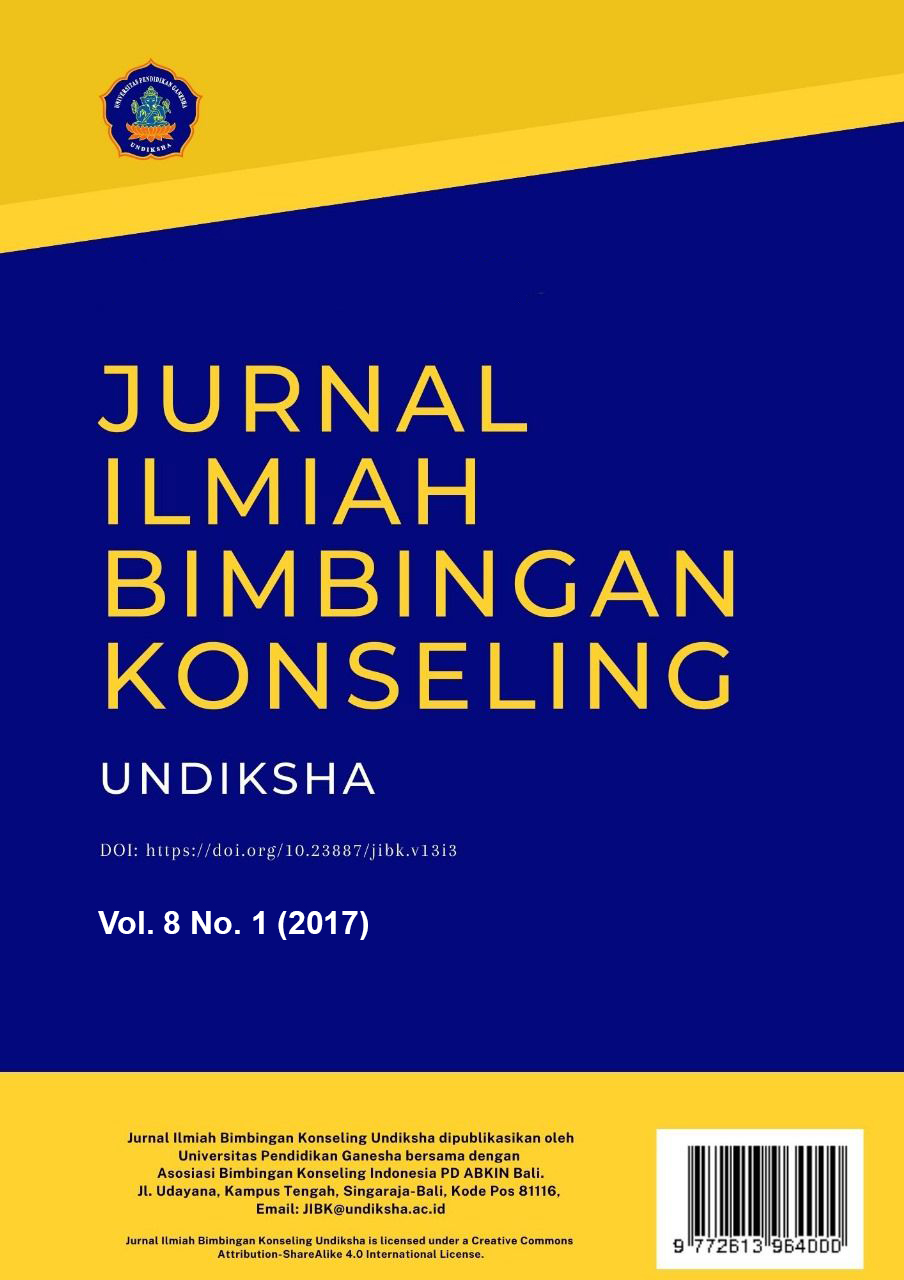PERBEDAAN EFEKTIVITAS MODEL KONSELING BEHAVIORAL TEKNIK MODELING DENGAN TEKNIK AVERSI TERHADAP SELF ENDURANCE SISWA KELAS X SMK NEGERI 2 SINGARAJA
DOI:
https://doi.org/10.23887/jibk.v8i1.11101Abstract
Penelitian ini bertujuan untuk mengetahui teknik modeling teori konseling behavioral efektif dalam meningkatkan bakat verbal siswa kelas X 7, untuk mengetahui teknik latihan asertif teori konseling behavioral efektif dalam meningkatkan bakat verbal siswa kelas X 6, dan untuk mengetahui perbedaan efektivitas teknik modeling dengan teknik latihan asertif teori konseling behavioral dalam meningkatkan bakat verbal siswa. penelitian ini termasuk penelitian eksperimen semu (quasi eksperimen). Proses pengumpulan data dalam penelitian ini menggunakan lembar observasi, lembar wawancara, buku harian dan kuesioner bakat verbal. Metode analisis data yang digunakan adalah t-test. Hasil penelitian ini yaitu kelompok eksperimen I ditreatmen dengan teknik modeling teori konseling behavioral dengan pembanding kelompok kontrol menghasilkan t hitung = 4,57> t tabel = 1,70. Kelompok eksperimen II ditreatmen dengan teknik latihan asertif teori konseling behavioral dengan pembanding kelompok kontrol menghasilkant hitung = 2,77> t tabel = 1,34. Treatmen menggunakan teknik modeling dengan teknik latihan asertif teori konseling behavioral didapatkan t hitung = 2,85 > t tabel = 1,69. Dari hasil penelitian ini, dapat disimpulkan bahwa teknik modeling teori konseling behavioral efektif dalam meningkatkan bakat verbal siswa kelas X 7, teknik latihan asertif teori konseling behavioral efektif dalam meningkatkan bakat verbal siswa kelas X 6, perbedaan efektivitas teknik modeling dengan teknik latihan asertif teori konseling behavioral dalam meningkatkan bakat verbal siswa.Kata Kunci : Behavioral, Modeling, Latihan Asertif, Bakat Verbal
The purpose of this research is to know the effectiveness of behavioral counseling model of modeling technique to experiment class I with students given conventional treatment to stabilize Self Endurance students of SMK N 2 Singaraja, to know the effectiveness of behavioral counseling model of aversi technique to experiment class II with students given Conventional treatment to stabilize Self Endurance students of SMK N 2 Singaraja, to know the difference of effectiveness of behavioral counseling model of modeling technique with aversi technique to Self Endurance student of SMK N 2 Singaraja. The process of collecting data in this study using observation sheet, interview sheet, diary and Self Endurance questionnaire. This research is a quasi research ("Quasi Experiment"), data analysis method used is t-test. The results of this experiment group I ditreatmen modeling model of behavioral counseling model with control class comparator produces Price t arithmetic> Price t table is 5.39> 1.684, experiment II ditreatmen aversi model behavioral counseling with control class comparing results Price t arithmetic> Price t Table is 2,58> 1,68, model Behavioral counseling technique of modeling and aversi technique have proven effective in improving Self Endurance student where result of F test stated that both variant of homogeny obtained t test result stated that Price t arithmetic> Price t table that is 2 , 80> 1.68. Result of calculation mean, also got = 11,30> = 4,775 From this research modeling technique more effective than aversi model of behavioral counseling model to stabilize Self Endurance of student of class X SMK Negeri 2 Singaraja.
keyword : Behavioral, Modeling, Aversi, Self Endurance
Published
Issue
Section
License
Jurnal Ilmiah Bimbingan Konseling Undiksha is an Open Access Journal. The authors who publish the manuscript in this journal agree to the following terms:
JIBK is licensed under a Creative Commons Attribution 4.0 International License. This permits anyone to copy, redistribute, remix, transmit and adapt the work provided the original work and source is appropriately cited.
This means:
Jurnal Ilmiah Bimbingan Konseling is licensed under a Creative Commons Attribution 4.0 International License.
(1) Under the CC-BY license, authors retain ownership of the copyright for their article, but authors grant others permission to use the content of publications in JIBK in whole or in part provided that the original work is properly cited. Users (redistributors) of JIBK are required to cite the original source, including the author's names, JIBK as the initial source of publication, year of publication, volume number, issue, and Digital Object Identifier (DOI); (2) The authors are the copyright owner of the article, and the author grants the JIBK held the first publication right.









.png)

.jpg)
